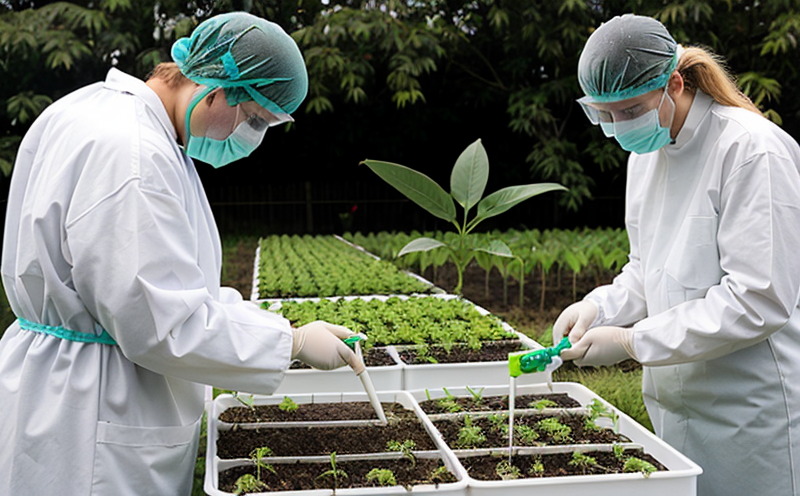Fusarium Species Detection in Plants
Understanding and managing Fusarium species within agricultural crops is critical for maintaining plant health and ensuring food safety. Fusarium species are a group of fungal pathogens that can cause significant economic losses by affecting crop yields, quality, and ultimately the livelihoods of farmers worldwide.
Fusarium species include several economically important genera such as Fusarium graminearum, which causes head blight in cereals; F. oxysporum, responsible for root rot diseases; and F. solani, known to cause wilt disease in various crops. The ability of these species to colonize plant tissues can lead to reduced crop quality, increased spoilage during storage, and the production of harmful mycotoxins.
Accurate detection of Fusarium species is essential for early intervention strategies aimed at mitigating their impact on agriculture. This involves a combination of field observation, laboratory testing, and monitoring programs that can help in identifying infected crops before they are harvested or marketed. The presence of Fusarium species can also affect the market value of agricultural products, making it crucial to implement effective management practices.
Standard methods for detecting Fusarium species typically involve culturing samples on selective media followed by microscopic examination and identification based on morphological characteristics. However, these traditional approaches have limitations in terms of sensitivity and speed. Modern techniques such as PCR-based assays provide faster results with higher specificity, making them ideal for routine testing in laboratories and agricultural settings.
Our laboratory offers advanced testing services to detect Fusarium species in various plant tissues including seeds, roots, leaves, and grains. Using cutting-edge molecular biology tools like qPCR (quantitative polymerase chain reaction), our team can identify even trace amounts of Fusarium DNA within complex mixtures of plant material. This capability allows for early detection and precise quantification of Fusarium species, enabling timely decisions regarding crop management.
The significance of Fusarium species detection extends beyond just identifying the presence or absence of pathogens; it also plays a role in understanding disease epidemiology and predicting future outbreaks. By analyzing samples from different geographic locations and time points, researchers can track changes in pathogen populations over time and space. Such information is invaluable for developing targeted control measures that address specific threats posed by Fusarium species.
In summary, accurate detection of Fusarium species through advanced laboratory techniques represents a vital tool in the fight against plant diseases caused by these fungi. Our comprehensive testing services provide reliable data on Fusarium presence and abundance, supporting informed decision-making processes aimed at protecting both crop productivity and public health.
Why Choose This Test
Selecting the right laboratory for detecting Fusarium species is crucial given its potential implications on agricultural practices, product quality assurance, and regulatory compliance. Here are some key reasons why our service stands out:
- Accurate Identification: Utilizing state-of-the-art molecular biology methods like qPCR ensures precise identification of Fusarium species even at low levels.
- Rapid Turnaround Time: Our highly efficient workflow allows for quick turnaround times, providing timely results essential for rapid response to emerging issues.
- Comprehensive Reporting: Detailed reports include not only the presence of Fusarium species but also quantification data and recommendations for mitigation strategies.
- Regulatory Compliance: We adhere strictly to international standards such as ISO 17025, ensuring that our services meet stringent quality requirements.
- Certified Personnel: Our team comprises experts with extensive experience in agricultural microbiology and plant pathology.
By choosing us for Fusarium species detection, you gain access to a partner committed to delivering high-quality services tailored specifically to your needs. Whether you're a farmer seeking assurance about the health of your crops or an industrial entity ensuring food safety throughout the supply chain, our laboratory offers unparalleled expertise and reliability.
Quality and Reliability Assurance
The quality and reliability of our testing services are paramount in maintaining confidence among stakeholders involved in agriculture and forestry sectors. To ensure consistent accuracy across all analyses, we employ stringent quality control measures at every stage of the process:
- Standard Operating Procedures (SOPs): Comprehensive SOPs guide our technicians through each step ensuring uniformity and precision.
- Duplicate Samples: For critical samples, duplicates are run to validate results and reduce variability.
- Calibration Checks: Regular calibration of instruments guarantees that all measurements remain accurate over time.
- Reference Standards: Use of certified reference materials helps maintain consistency with accepted benchmarks.
- Inter-laboratory Comparisons: Participating in inter-laboratory studies ensures our results align with those from other reputable institutions globally.
We are accredited to ISO 17025, which signifies that we meet the highest standards set by internationally recognized bodies. This accreditation is a testament to our commitment towards excellence and continuous improvement in laboratory practices. It also assures clients of the robustness of our methodologies and the integrity of our data.
Our quality management system encompasses not only technical aspects but also encompasses ethical considerations, ensuring fair treatment of all samples received regardless of origin or potential impact on business operations. By adhering to these principles rigorously, we uphold our reputation as a trusted provider of reliable testing services.
Competitive Advantage and Market Impact
Early detection of Fusarium species offers several competitive advantages that can significantly impact market performance. These include:
- Preemptive Measures: Identifying Fusarium species early allows for proactive measures such as quarantine, crop rotation, and chemical treatments before extensive damage occurs.
- Informed Decision Making: Understanding the prevalence of Fusarium within a specific region or farm enables better resource allocation decisions, potentially leading to higher yields and improved product quality.
- Enhanced Reputation: Demonstrating a commitment to maintaining crop health through rigorous testing can enhance brand image among consumers who value safety and sustainability.
- Compliance with Regulations: Staying ahead of regulatory requirements by being able to quickly identify Fusarium species ensures compliance and avoids costly penalties.
Moreover, incorporating Fusarium detection into routine agricultural practices can contribute positively towards sustainable farming methods. It supports efforts aimed at reducing chemical usage while promoting healthier ecosystems, thereby contributing to long-term profitability for producers and environmental benefits for society as a whole.





